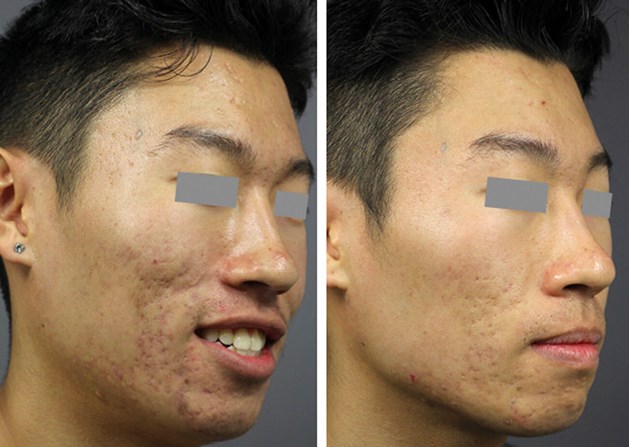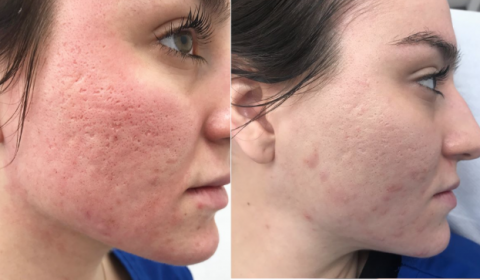Leading Acne Treatment for Sensitive Skin: Mild Solutions for Clear Skin
Leading Acne Treatment for Sensitive Skin: Mild Solutions for Clear Skin
Blog Article
Comprehending the Various Skin Conditions and Effective Therapy Choices for Acne Scars
Acne scars represent an intricate interaction of skin problems that dramatically impact people' self-confidence and overall skin health and wellness. As we explore the landscape of acne mark administration, it comes to be evident that the trip toward clearer skin may entail more than simply topical options.
Sorts Of Acne Scars

On the other hand, hypertrophic marks arise from an overproduction of collagen throughout the recovery process, causing elevated areas on the skin. These marks are often firm and can differ in shade, often appearing red or darker than the surrounding skin.
Recognizing these types of acne scars is vital for creating an efficient therapy plan - skin rejuvenation treatments. Alternatives may include chemical peels, laser therapy, microneedling, or dermal fillers, customized to the details mark kind. A comprehensive examination with a skin doctor can help figure out one of the most appropriate treatment, taking into consideration the individual's skin type, scar extent, and general skin wellness
Causes of Acne Scarring
Marking occurs as an outcome of the body's natural healing feedback to inflammation and injury created by acne sores. When acne forms, it causes an inflammatory action, resulting in the launch of different cytokines and growth elements that promote recovery. This procedure can often lead to excessive tissue formation or poor repair service, resulting in marks.
The primary reasons for acne scarring consist of the intensity of the acne itself, duration of the lesions, and specific skin types. Serious inflammatory acne, such as cysts and blemishes, is most likely to result in scarring because of deeper tissue damages. Additionally, improper handling of acne lesions, such as pressing or picking, can worsen tissue injury and swelling, enhancing the likelihood of scarring.
Hereditary tendency likewise plays a substantial role; people with a household history of scarring are at a higher danger. In addition, skin kind and color can affect scar formation, as darker skin tones may experience post-inflammatory hyperpigmentation, while lighter skin may establish atrophic marks.
Eventually, comprehending these reasons is necessary in managing acne and minimizing the capacity for scarring.

Therapy Options for Scarring
Efficient therapy alternatives for acne scarring vary depending on the kind and intensity of the scars. Typically categorized right into atrophic, hypertrophic, and keloid marks, these conditions require customized approaches for optimum results.
For atrophic marks, which are defined by a loss of cells, treatments such as chemical peels, microdermabrasion, and laser therapy are typically employed. These methods advertise skin revival and boost collagen manufacturing, thus improving skin appearance. Subcision, a minimally intrusive procedure, can additionally work by separating fibrous bands beneath the skin.
Keloid and hypertrophic scars can be more challenging to deal with. Choices consist of corticosteroid shots to lower inflammation and flatten the marks. Sometimes, cryotherapy or laser therapy may be recommended to decrease their appearance.
Surgical alternatives are available for severe scarring, where excision or skin grafting might be needed. It's necessary for people to seek advice from a skin specialist to examine their particular mark type and go over the most suitable therapy plan. Integrating several therapies usually produces the most effective results, making certain that each patient's one-of-a-kind skin disease is addressed successfully.
Natural Home Remedy and Natural Solutions
Natural remedies and natural remedy can offer an available approach for people seeking to enhance the appearance of acne marks (acne and acne scars treatment). Various active ingredients located in the home kitchen have actually demonstrated prospective advantages in boosting skin appearance and promoting recovery

One more reliable choice is lemon juice, which acts as a natural exfoliant and can lighten hyperpigmentation. It ought to be made use of meticulously, as it might cause photosensitivity. Oatmeal masks are also advantageous; their gentle exfoliation can assist remove dead skin cells while relaxing irritability.
Essential oils, such as tea tree oil and lavender oil, can even more sustain scar recovery because of their antimicrobial residential properties. It is vital to perform a patch test before using any type of remedy to make certain there are no unfavorable responses. These natural services can be a complementary approach in the trip to lessen acne scars.
Preventing Future Scarring
Embracing a proactive approach to skin care can dramatically reduce the threat of developing future acne marks. One of the key strategies is to take care of acne effectively as it occurs. This includes utilizing non-comedogenic skincare products and medications prescribed by skin specialists that target acne without aggravating the skin. Regular cleaning, peeling, and hydration can aid maintain skin health and protect against stopped up pores.
Additionally, avoiding the lure to pick or press acne sores is important, as this can lead to swelling and succeeding scarring. Rather, people need to concentrate on using topical treatments that blog advertise healing and decrease swelling. Components such as salicylic acid, benzoyl peroxide, and retinoids are known for their efficiency in handling acne and minimizing marks.
Sun security is another essential component; direct exposure to UV rays can impede and dim scars healing. Therefore, making use of a broad-spectrum sun more tips here block daily can minimize these effects - acne treatment for sensitive skin.
Lastly, preserving a healthy diet rich in antioxidants and staying hydrated assistances skin regeneration. By carrying out these safety nets, individuals can dramatically reduce their risk of future scarring and advertise total skin health and wellness.
Conclusion
In conclusion, an extensive understanding of acne marks, encompassing both atrophic and hypertrophic kinds, is vital for reliable treatment methods. Assessment with a skin doctor continues to be important to devise customized approaches that take into consideration private skin types and mark severity, ultimately improving the effectiveness of scar administration strategies.
Acne scars stand for a complicated interplay of skin conditions that substantially impact individuals' self-esteem and overall skin health and wellness. The two primary classifications of acne scars are hypertrophic and atrophic scars. These marks are further identified right into three subtypes: ice pick scars, which are deep and check these guys out slim; boxcar scars, which are broader and have distinct sides; and rolling scars, which develop a wave-like look due to irregular skin appearance.
A complete appointment with a skin doctor can help identify the most ideal treatment, taking into account the individual's skin type, scar seriousness, and total skin health.
Consultation with a dermatologist continues to be necessary to create individualized strategies that think about specific skin types and scar intensity, ultimately boosting the efficacy of mark management methods.
Report this page